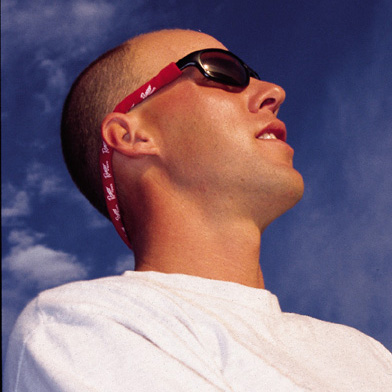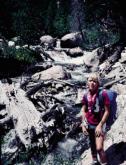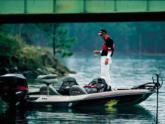Cal tech

California native Aaron Martens is a true fishing technician with a keen awareness of and an obsession for perfection
Aaron Martens pulls into a lakeside boat ramp at 5:30 a.m. to start his workday. In tow is his bass boat – a purple Ranger. His boat is not a little bit purple, but very purple – sparkling purple, like it was made from a million crushed amethyst stones.
On the ramp, professional bass anglers are launching their boats for a day of practice on Lake Toho in Central Florida. Anglers congregate in small clusters of conversation, awaiting the sun to finish breaking through the morning mist.
It is December and the most pressing topic is deer hunting. Soft, twangy country music leaks out from one angler’s truck and mixes with recent hunting tales.
When Aaron wheels his majestic rig into position on the launch ramp and opens the door, the sound of techno dance music spills out onto the ramp. Dizzying synthesizers reverberate off the concrete like a carousel. The thick down beat punches the humid Florida air.
The 29-year-old California native steps out of the truck, puts on his sunglasses and says, “Whoa, du-ude! Check out the killer sunrise!” to nobody in particular.
An angler from the deer-hunting circle raises his voice. “Hey Aar-ron, you gettin’ ’em on that drop-shawt down here in Florida?” he asks.
Aaron, with a lanky frame and a recently shaved head, greets the gentlemen with the enthusiasm of a surfer coming off his first wave of the morning. “No way, dude. These fish are still schooling, man,” he replies with a tremolo voice steeped in California’s San Fernando Valley. “They just come up and start mackin’ out on the surface. It’s unreal, dude.”
If professional bass fishing were a box of Cracker Jacks, among the popcorn and peanuts, Aaron would be the surprise. From his purple boat and techno music to his California dialect, Aaron is not the typical, garden-variety tournament bass angler.
But Aaron’s dissimilarity is not conjured up. He is not trying to rebel against conventions or settle a score. Nor is he haughty about his accomplishments.
Aaron’s variance from the norm is original and pure. He is the kid doing his own thing. And the kid from California has an inherent knack for catching bass.
Since turning pro at 21, Aaron has won 15 boats and a truck. Since starting the BASS Tour in 1998 he has won two BASS Western Invitationals and qualified for the Bass Masters Classic three times in a row.
His rookie year on the Wal-Mart FLW Tour was 2001, and he finished third in the points race, adding $46,500 to his bank account in the process. But what “stoked” Aaron more was winning the Ranger Cup. He earned an extra $50,000 this year for being the most consistent Ranger owner on the Wal-Mart FLW Tour and BASS Tour.
Nature Boy
Unlike a majority of his competitive counterparts who were introduced to the outdoors through hunting and fishing, Aaron discovered the outdoor world though backpacking.
Jerry Martens, Aaron’s father, is a veteran trekker. He has left footprints in the sands and snows of Peru, Afghanistan, Nepal and Mexico.
The notion behind extreme trekking or backpacking is to traverse great distances on foot – usually over mountains, through valleys or across deserts – with life’s bare essentials strapped to one’s back. The word shelter refers to a tarp stretched between two rocks, and amenities on such a trip include a fresh pair of socks and a toothbrush.
Aaron started backpacking with his father when he was 7. Despite being 10 years younger than his two older brothers, Aaron was included on the most strenuous hikes.
 “A couple of times a year we would do these massive hikes, like 100 to 120 miles in one week across the Sierra Madres,” Aaron says. “We would hike 15 to 20 miles a day in altitudes up to 10,000 feet through some gnarly terrain. I was probably the fittest 8-year-old in the West.”
“A couple of times a year we would do these massive hikes, like 100 to 120 miles in one week across the Sierra Madres,” Aaron says. “We would hike 15 to 20 miles a day in altitudes up to 10,000 feet through some gnarly terrain. I was probably the fittest 8-year-old in the West.”
The Martens lived off the land during many of their hikes. The Sierra Madre range is streaked and dotted with snowmelt streams and high country lakes. The streams are pure enough to drink from and the small lakes are teaming with trout. The family discovered it was easier to carry a tiny ultralight rod and a bottle of cooking oil than enough dry pack food for five days.
Relying on the bounty of the mighty Sierras was an aspect of the family hikes that Aaron particularly relished. “We would set up camp next to a lake, and I would catch trout for the whole family,” Aaron recalls. “Then I would gather fresh onions, mushrooms and berries from the stream sides.”
But not all of the family’s hiking adventures were picnics under the stars. On several occasions the Martens were faced with serious life-threatening situations.
One starlit night turned into a blizzard that dumped 3 feet of snow on the Martens’ homemade tents. “The water in our bottles froze solid during the night,” Aaron says. “We were not prepared for those conditions. We had to hike out in the dark because keeping your body moving was the only way to stay alive.”
In another near disaster, the Martens ran out of water while on a desert trek through Death Valley. An anticipated stream-fed oasis, based on careful map study, failed to materialize. Desperate for water after a long day of walking in 100-degree heat, Aaron finally got his first drink of water at dusk from a hot, stagnant watering hole for animals. “It was so gross,” he recalls. “But you would be surprised what you will drink when you are about to swallow your tongue and you are dizzy from dehydration.”
Other serious mishaps that could have proven fatal for Aaron include being swept away in the raging waters of a flash flood on the Sisquoc River and plummeting 30 feet into a canyon ravine.
Aaron earned the nickname “Nature Boy” among his friends because of his resilience, love for animals and appetite for plants that he ate right from the ground.
By the time the Nature Boy entered his teens, he was more fascinated with fishing than with hiking. His mother, Carol Martens, now a professional angler, began taking Aaron fishing when he was 13.
“His dad had him hiking all over the Sierras since he was 7,” Carol says. “Fishing is not Jerry’s thing, so as Aaron’s interest in fishing grew, I kind of took over. Plus, as a mother, I can say our fishing trips were a lot safer than some of those hiking adventures his father had him on.”
Initially, Aaron had a penchant for striped bass. “Our routine was to drive up to Lake Pyramid, rent a boat from the marina and fish for big stripers,” Carol says. “We would occasionally catch a largemouth by mistake, but we did not care much about them.”
One Saturday morning, mother and son arose early to rent a boat on California’s Lake Casitas. At the marina, they witnessed 100 sleek tournament bass boats preparing to take off. It was Aaron’s first exposure to competitive fishing. But stripers did not count – only black bass. “Our whole life changed that day,” Carol recalls.
From that moment on, Aaron and Carol dedicated themselves to bass fishing. The mother-and-son team went on to dominate team tournament trails in the West. “I have a house full of trophies from those days,” Carol says.
With the quick success came resentment from competitors. “They said Aaron and I … were just lucky,'” she recalls.
But as tournament bass anglers know, luck can only last so long. Considering Aaron’s continued success, even on eastern waters, luck has long been dismissed as a determining factor.
Aaron’s success
Anyone who has seen Aaron compete immediately notices that his fishing style is as unique as his demeanor. He has marveled bass-fishing fans and puzzled his competition with the magic of the drop-shot rig.
He has successfully applied the unique rig in eastern waters and stunned locals at the 2001 Lake Martin Wal-Mart FLW Tour stop last season when he used the drop shot to bring in consistent catches of hefty spotted bass to finish third.
Disciplined in the ways of finesse fishing, Aaron is a tackle technician. For Aaron, 8-pound test line is a completely different tool than 10-pound test line. A 3/16-ounce weight is an anchor when compared to a 1/8-ounce weight. What other anglers consider insignificant differences are like apples and oranges to Aaron.
Carol, who spent a decade in the boat with Aaron during his early years, gives some insight to the attributes of Aaron’s success.
 “For one thing, he is self-taught,” Carol says. “He had a few bass club guys point him in the right direction in the beginning, but other than that, Aaron and I have spent a gazillion hours in the boat together experimenting with different techniques.”
“For one thing, he is self-taught,” Carol says. “He had a few bass club guys point him in the right direction in the beginning, but other than that, Aaron and I have spent a gazillion hours in the boat together experimenting with different techniques.”
Aaron’s mom also describes him as a person with a keen awareness for minute details and obsession with perfection. “He has eyes in the back of his head,” she says. “When we are fishing, he says, `Mom, your worm is not straight,’ or `your knot is crooked.’ He knows when my line is frayed even before I do. He is a merciless tyrant as a team partner.”
She says Aaron is determined to do his own thing. “Even when he knows people are catching fish in other ways or locations, he won’t do it. He wants to do it his way.”
Carol believes her son also has enhanced senses that contribute to his fishing abilities. “He will not let me wear perfume, hairspray or even chew gum when I fish with him in a tournament because such things inhibit his smelling ability. Even when I sneak a mint, he smells it immediately.”
She also says Aaron’s senses of sight and hearing are acute. “The doctor says he is colorblind, but he can see a fish a hundred feet away. And he can hear a nearby angler catch a fish without ever seeing it for himself.”
Go east, young man
Professional bass fishing is a sport that is rooted in the eastern half of the United States. This has always been a tremendous hurdle for Western anglers who are trying to achieve national recognition. Anglers from the West who compete at the national level have been forced to move to Texas or the Midwest to be closer to the aqueous office complexes of the East.
Aaron is trying a different approach. Recently he and his wife, Lesley, purchased a second home in Alabama. Flying now eliminates the three- to five-day cross-country trips.
Aaron admits that living out of his truck for the last three years has taken its toll. “Everything I own is either in my truck or scattered about at people’s houses where I occasionally stay,” he says. “I am tired of Laundromats and roughing off other people’s washing machines. If nothing else, I just want my own washer and dryer in the East.”
Along with eliminating cross-country pilgrimages to fish tournaments, purchasing another house allows Aaron to focus his time and energy on learning the habits of bass in Eastern impoundments. “I understand Western fisheries pretty well. But in the East, I have weaknesses I want to work on,” Aaron admits. “I need to strengthen my spinner-bait and cranking game. They are crucial baits on Eastern waters.”
It is by no coincidence that Aaron’s Alabama home is near Birmingham where numerous lakes that typify Eastern impoundments are found. “Lakes like Wheeler throw me a curve ball,” Aaron says. “Just a small drop in the water level or temperature really moves those fish, and I can’t seem to re-connect with them when they move. I can’t wait to get on those lakes and experiment, like I used to do as a kid.”
“As a kid” is a common phrase for Aaron. He is the kid doing his own thing and winning.